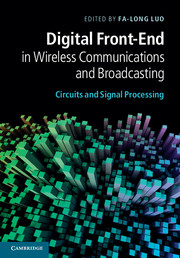Book contents
- Frontmatter
- Contents
- Contributors
- Preface
- Part I Introduction to digital front-end
- Part II DPD and CFR
- 6 General principles and design overview of digital predistortion
- 7 Power amplifier nonlinear modeling for digital predistortion
- 8 Look-up table based digital predistortion schemes and implementation
- 9 Digital predistortion and its combination with crest factor reduction
- 10 Adaptive digital baseband predistortion
- 11 Crest factor reduction techniques
- Part III DUC, DDC, ADC, DAC, and NCO
- Part IV Digital calibration, imbalance compensation, and error corrections
- Part V Circuits and system integration in digital front-end
- Index
- References
10 - Adaptive digital baseband predistortion
design and implementation
from Part II - DPD and CFR
Published online by Cambridge University Press: 07 October 2011
- Frontmatter
- Contents
- Contributors
- Preface
- Part I Introduction to digital front-end
- Part II DPD and CFR
- 6 General principles and design overview of digital predistortion
- 7 Power amplifier nonlinear modeling for digital predistortion
- 8 Look-up table based digital predistortion schemes and implementation
- 9 Digital predistortion and its combination with crest factor reduction
- 10 Adaptive digital baseband predistortion
- 11 Crest factor reduction techniques
- Part III DUC, DDC, ADC, DAC, and NCO
- Part IV Digital calibration, imbalance compensation, and error corrections
- Part V Circuits and system integration in digital front-end
- Index
- References
Summary
Introduction
The radio frequency (RF) power amplifier (PA) is the most power consuming element in a wireless transmission system, and can account for more than 50 percent of the total power consumed by the transmitter [1]. Improving the PA efficiency saves energy and drives down the overall system costs. A study described in [2, p. 13] provides a compelling reason for PA linearization: application of PA linearization technologies can yield annual savings of millions of dollars for a typical network service provider.
Efficient PAs are usually nonlinear. Nonlinearity generates both in-band distortion and out-of-band interference, which manifest in terms of transmitter error vector magnitude (EVM) degradation and spectral regrowth. In wireless communication systems, many signal formats, such as Code Division Multiple Access (CDMA) and Orthogonal Frequency Division Multiplexing (OFDM) transmission, have been introduced to improve spectrum efficiency and data rate. However, these non-constant-envelope signals are not power efficient in the presence of nonlinear PAs as large back-offs are needed for linear transmission. In most commercial wireless communication systems, PAs are still the dominant source of signal quality degradation since the PAs are usually biased in a mildly nonlinear region to gain a reasonable amount of efficiency.
Information
- Type
- Chapter
- Information
- Digital Front-End in Wireless Communications and BroadcastingCircuits and Signal Processing, pp. 280 - 308Publisher: Cambridge University PressPrint publication year: 2011
References
Accessibility standard: Unknown
Why this information is here
This section outlines the accessibility features of this content - including support for screen readers, full keyboard navigation and high-contrast display options. This may not be relevant for you.Accessibility Information
- 4
- Cited by
